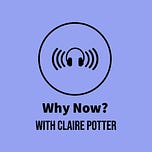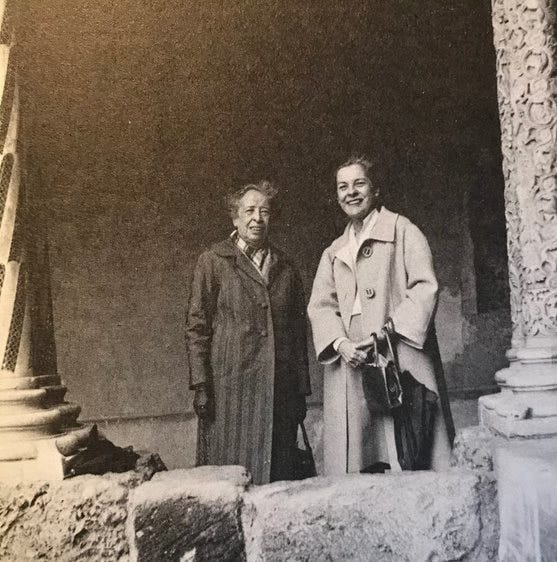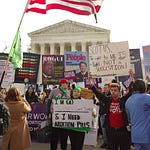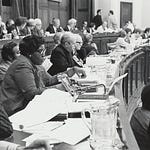Hannah Arendt (left) and Mary McCarthy in the early 1970s: close friends, they were two of the very few women identified as “New York Intellectuals.” Photo credit: Unknown/Wikimedia Commons
Picture this: it’s 1936, the depths of the Great Depression in New York City, and you are a bright, Jewish, first-generation American man. You are a teenager, maybe even as young as fifteen or sixteen, from the Lower East Side, Brownsville, Brooklyn, or the Bronx. You’re smart, you’ve finished high school, and what your parents want more than anything else is for you to get a college degree and be a professional, not a garment worker or shopkeeper like they are. If your family has a little money, you’ll commute to Columbia; if your parents have done better, they might be able to scrape together tuition and board for Yale, Harvard, or some other elite school that takes its quota of Jews every year.
But for ambitious men without money, there’s a college a subway ride away, on the north end of Manhattan. And it’s free. It’s a college that’s so good, and so famous for its radical politics that its nickname is “The Harvard of the Proletariat.” It’s City College, and there are so many smart people there that going to lunch is like a whole other class.
Conservative William Kristol’s, father, Irving, graduated with the class of 1940. He was a history major, a Trotskyist, and a devoted member of the Young People’s Socialist League, and he held down one of the alcoves in that lunchroom where students argued hotly about politics.
These verbal battles represent what became famous in twentieth century American political thought as “left sectarianism:” reading Karl Marx, not just against the evidence of what had been done in Marx’s name, but in relation to the American democratic ideal and everyone who had written after Marx. Their arguments were more than abstract. Adolf Hitler was on the march in Europe. The Communist Party was becoming increasingly prominent among intellectuals and artists in the United States. Kristol’s intellectual lodestar, Leon Trotsky, one of the original Bolshevik revolutionaries, was both writing furiously and struggling to stay one step ahead of Josef Stalin’s assassins—who killed him with an ice pick a few months after Kristol’s class graduated.
Their politics were all deadly serious: it’s even possible that a young electrical engineering student named Julius Rosenberg occasionally joined one of the alcoves at City College. But these men—Kristol, Irving Howe, Sidney Hook, Seymour Lipset—all students of philosophy professor Morris Cohen also had another project. They were inventing a virile intellectual style and agenda that was distinctively Jewish and secular, and imagining how they would get their ideas to the public. Like one of Cohen’s associates, Lionel Trilling, the first Jewish literature professor to be hired at Columbia University, they believed that the looming battle against totalitarianism would be fought with words, pens, and ideas.
And after World War II, and through the 1980s, they did exactly that, in publications like Menorah Journal, Commentary, Partisan Review, and Dissent. They, and new recruits like Norman Podhoretz and Daniel Bell, as well as a select group of women—Hannah Arendt, Mary McCarthy, Elizabeth Hardwick, Midge Decter, and Lionel Trilling’s wife Diana—became known as “The New York Intellectuals,” a generation of thinkers who redefined the art of political argument in the United States and elevated it to a contact sport.
That’s the story historian Ronnie Grinberg tells in her new book, Write Like a Man: Jewish Masculinity and the New York Intellectuals (Princeton University Press, 2024.)
Show notes:
Bill Kristol’s description of the City College lunchroom is from an interview he did with journalist David Brooks on CSPAN-2’s Book TV, February 11, 2011.
Ronnie mentions another study of the New York Intellectuals’ intimate lives, Partisans: Marriage, Politics, and Betrayal Among the New York Intellectuals (Simon & Schuster, 2000).
Claire and Ronnie discuss the effects of antisemitism on the development of Jewish masculinity in the 20th century. You can read more about this in Leonard Dinnerstein, Anti-Semitism in America (Oxford University Press, 1994).
Claire mentions Ann Roiphe’s memoir about the literary parties of the 1950s and 1960s, Art and Madness: A Memoir of Lust Without Reason (Nan A. Talese, 2011).
Claire and Ronnie discuss the marriages of New York Intellectuals: one first person account of a marriage is Diana Trilling, The Beginning of the Journey: The Marriage of Diana and Lionel Trilling (Harcourt & Brace, 1993).
Ronnie gives a shout-out to Natalie Robins’s biography of Diana Trilling, The Untold Journey: The Life of Diana Trilling (Columbia University Press, 2017). You can find Daphne Merkin’s review, which Ronnie mentions, here.
Listeners interested in learning more about antisemitism in universities may want to listen to Tablet Magazine’s podcast Gatecrashers (2022).
In a discussion about the wives editing their famous husbands’ work, Ronnie mentions Ben Moser’s Pulitzer-Prize winning Sontag: Her Life and Work (Ecco, 2019).
Ronnie notes the unsung work of wives in their husbands’ writing and scholarship: see Tim Lacy, ““Mrs. Hofstadter” and the Myth of the Heroic Lone Scholar,” S-USIH blog, January 18, 2018.
Claire gives a shout out to Cathy Curtis’s A Splendid Intelligence: The Life of Elizabeth Hardwick (W.W. Norton, 2021).
Ronnie references Norman Podhoretz’s memoir, Making It (Random House, 1967)), and now available from the New York Review of Books Classics series.
You can download this podcast here or subscribe for free on Apple iTunes, Spotify, Google Podcasts, or Soundcloud. You can also keep up with Political Junkie content and watch me indulge my slightly perverse sense of humor on Instagram, Threads, and TikTok.
If you enjoyed this episode, why not try:
Episode 43, Where In the World Is Merze Tate? A conversation with historian Barbara Savage about freedom, independence, and her biography, "Merze Tate: The Global Odyssey of a Black Woman Scholar."
Episode 23, Creative Fictions: A conversation with historian Sam Franklin about "The Cult of Creativity: A Surprisingly Recent History."
Episode 12, All The News That's Fit To Print: A conversation with historian Kathryn McGarr about American journalism, foreign policy, and "City of Newsmen: Public Lies and Professional Secrets in Cold War Washington"
And here’s a bonus:














Share this post